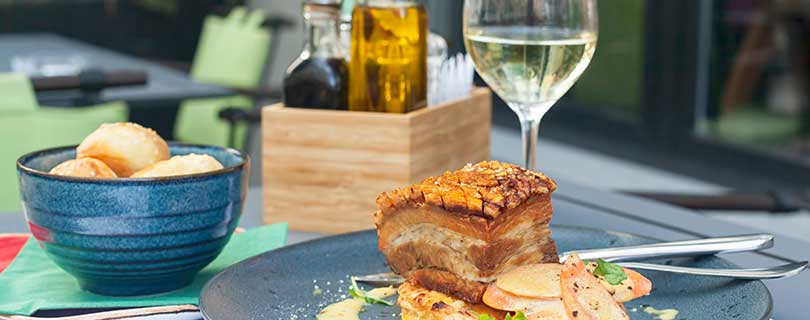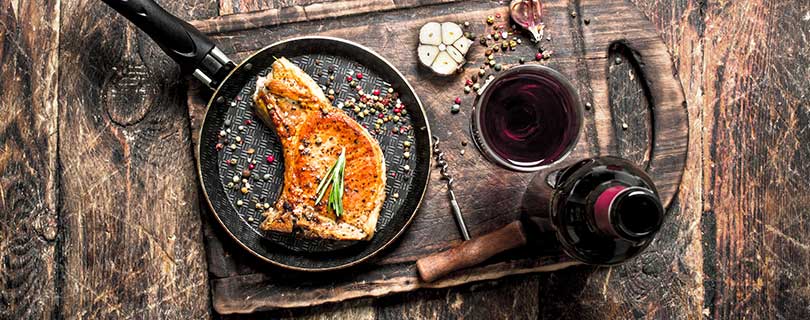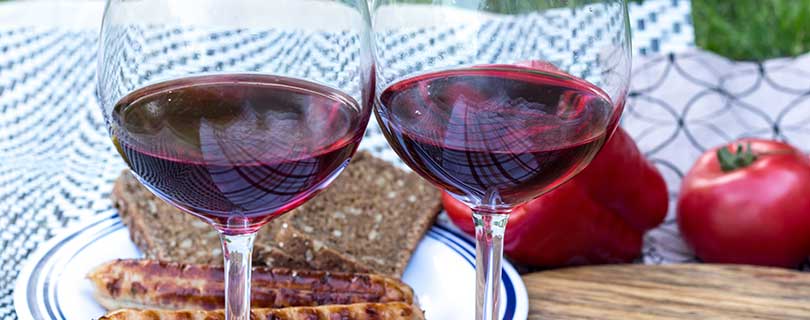Pork is a versatile meat that can be prepared and cooked in many ways, so there are a plethora of pairing possibilities with wine.
From light and delicate to bold and robust, you’re sure to find a wine you love that complements the flavours of your dish. So, whether you’re going for pulled pork in a bun, a bowl of sweet and sour pork, a pork chop or a classic roast, read on for the right pork and wine pairings.
General rules for pork and wine pairing
One of the most common guidelines for pairing food and wine is broadly matching them according to colour. This means matching red wine with red meat and white wine with light-coloured meat.
Pork is an exception, not least because it can absorb complex flavours from marinades, rubs and sauces. This means it can be paired with red and white wine.
However, texture and flavour can vary according to the type of dish you are eating and this should influence your choice when you’re picking the best wine pairing.
For instance, a leaner cut of pork may suit a light wine, while a fattier pork dish will benefit from a fruity, more acidic wine to cut through the richness. Considering these stronger flavours is key if you decide to use a spicy seasoning or tangy sauce in your pork dish.
There’s no real hard or fast rule when pairing wine with roast pork. Ultimately, it comes down to personal preference, but here we offer some guidance on the wines that often work well with pork.
Pork roast
The general rule for pairing wine with a roasted pork joint is to stick with rich whites or juicy reds.
White wine pairing
When you’re looking for the perfect white to pair with roast pork, you'll want something medium to full bodied, rich and acidic. Look for complementary flavours and aromas.
Chenin Blanc is a classic pairing. Its notes of citrus, green apple and pear are perfect flavour pairings with roast pork. The wine's high, fresh acidity cuts through the richness of the pork while enhancing its naturally sweet-salty flavours.
Red wine pairing
If you prefer red wine with your roast dinner, look for a fruity and easy-drinking style with soft tannins and a lighter body to avoid overpowering your meal.
We would suggest an Australian Grenache, particularly one from Barossa Valley. Grenache wine's cherry and raspberry notes enhance the pork’s savoury flavours and a bright acidity that cuts through the cooked meat’s richness.
Pork belly
Pork belly can be a fatty dish, so opt for a high-acidity wine that will cut through the richness.
White wine pairing
A crisp dry white wine, such as Riesling, is a great pairing with pork belly. Notoriously high in acidity, it can cut through the fattiness of pork belly, acting as a palate cleanser. Highly aromatic, Riesling's green fruit and tropical flavours balance the pork's richness.
An aromatic Viognier is also a delicious match for pork belly. Its complementary notes of peach, apricot, honeysuckle and apple blossom enhance the pork's natural sweetness.

Sparkling wine pairing
Pork belly and sparkling wine might seem like an unlikely combination, but it's one worth trying.
A dry, crisp sparkling white wine can work well. For example, Prosecco has complementary notes of green apple and pear and its bright acidity cuts through the fatty richness while the refreshing bubbles cleanse your palate as you enjoy your meal.
Red wine pairing
Try a Pinot Noir, Beaujolais or Cabernet Franc wine to enjoy a red wine with pork belly. These wines are typically light, juicy and smooth, with red fruit flavours like raspberry, cherry and strawberry. Their low tannin levels mean they won't be overwhelmed by pork belly's rich and salty taste.
Pulled pork
Pulled pork is a delicious crowd-pleaser. When cooked on the barbie or in the oven, it’s tender and full of flavour, but which wine will do it justice?
White wine pairing
A racy, aromatic Grüner Veltliner is a food-friendly white wine from Austria. With its citrusy zing, it perfectly cuts through the fatty, slow-cooked richness of pulled pork.
A fruity late-harvest Riesling could be the perfect match if you’ve tossed your pulled pork in a barbecue sauce. It can complement the natural sweetness of sweet sauces and balance the heat in those with a spicy kick.
Red wine pairing
If you're going for a red, try a medium- to full-bodied wine with soft tannins to match the tender texture of the pork.
An Australian GSM (Grenache, Shiraz and Mataro) can pair well. Australian Grenache-based blends are known for their bright red fruit flavours, such as strawberry, raspberry and cherry, complementing pulled pork's savoury flavours and sweetness.
An oak-aged Malbec would also be an ideal choice – it's rich, soft and packed with complementary plum and cherry flavours. When Malbec is oak-aged, the wine can take on a matching smoky characteristic.
Pork chops
Barbecued, roasted, pan-fried, drizzled with a herb sauce – there are many ways to enjoy pork chops.
White wine pairing
Although many pork dishes benefit from a lighter, brighter white wine pairing, pork chops can pair with something a little richer and more textured.
A buttery, oak-aged Chardonnay, with notes of tropical fruit, citrus, butter and vanilla and a rich texture, could complement the natural sweet hint of pork and its fattiness.
Red wine pairing
As with roast pork, stick to lighter, brighter reds packed with juicy and complementary fruit flavours to pair with your pork chops.
Australian Grenache is known for its bright red fruit flavours – think raspberry, cherry and strawberry. Its medium body and moderate tannins make it a great match for pork chops' tender and slightly sweet flavours.
If not, try a Pinot Noir. Light and fruity, this wine's earthy notes can enhance the pork's natural sweetness.

Sweet & sour pork
A tangy bowl of sweet and sour pork is often a must-have part of a Chinese takeaway or homemade feast.
White wine pairing
A lighter, brighter and fresher style of white wine is a good pairing for a dish as complex as sweet and sour pork.
Try a glass of Sauvignon Blanc. An Australian Sauvignon Blanc has a high acidity and fresh citrus notes that cut through the pork's richness and balance out the sweet and sour contrast. Its vibrant flavours of lime, green apple and herbs enhance the dish's tangy complexity.
Red wine pairing
Avoid heavy, full-bodied reds when pairing with sweet and sour pork – you don't want to mask the complex flavours and tender texture.
Pinot Noir is a great red wine pairing for sweet and sour pork. Its light to medium body, bright acidity and red fruit flavours of cherry and raspberry complement the tangy sweetness, and its soft tannins won’t overpower the tender pork or silky sauce.

Sausages
Finally, the humble sausage is one of the most popular ways to enjoy pork. Whether you wrap them in a bread slice or roll, or serve them with a side of mash, snags are satisfying and packed with flavour. But which wine works best?
White wine pairing
Sausages are made with many additional ingredients, so a reliable, all-rounder white wine can be the perfect choice.
If you're cooking herby sausages or plan to serve them with cooked apples, an unoaked Chardonnay with bright acidity and citrus notes can be a good match, as it won’t overpower the delicate herbs in the sausages.
An off-dry Gewürztraminer is also a winner. This flavourful, complex wine is famous for its intense, complementary aromas of juicy lychee and blossom and fresh, palate-cleansing acidity.
Red wine pairing
Some sausages have a warmer kick than others, often from a pinch of spice or cracked black pepper. These pair deliciously with a more robust, medium- to full-bodied red.
Look for a Shiraz with ripe, juicy fruit flavours like blackberry, plum and dark cherry. These fruity notes can complement the spiciness of the sausages and provide a nice contrast.
Many Australian Shiraz wines have spicy or peppery notes that can work well with the same flavours in sausages.

Discover our full selection of red wines and white wines.


















